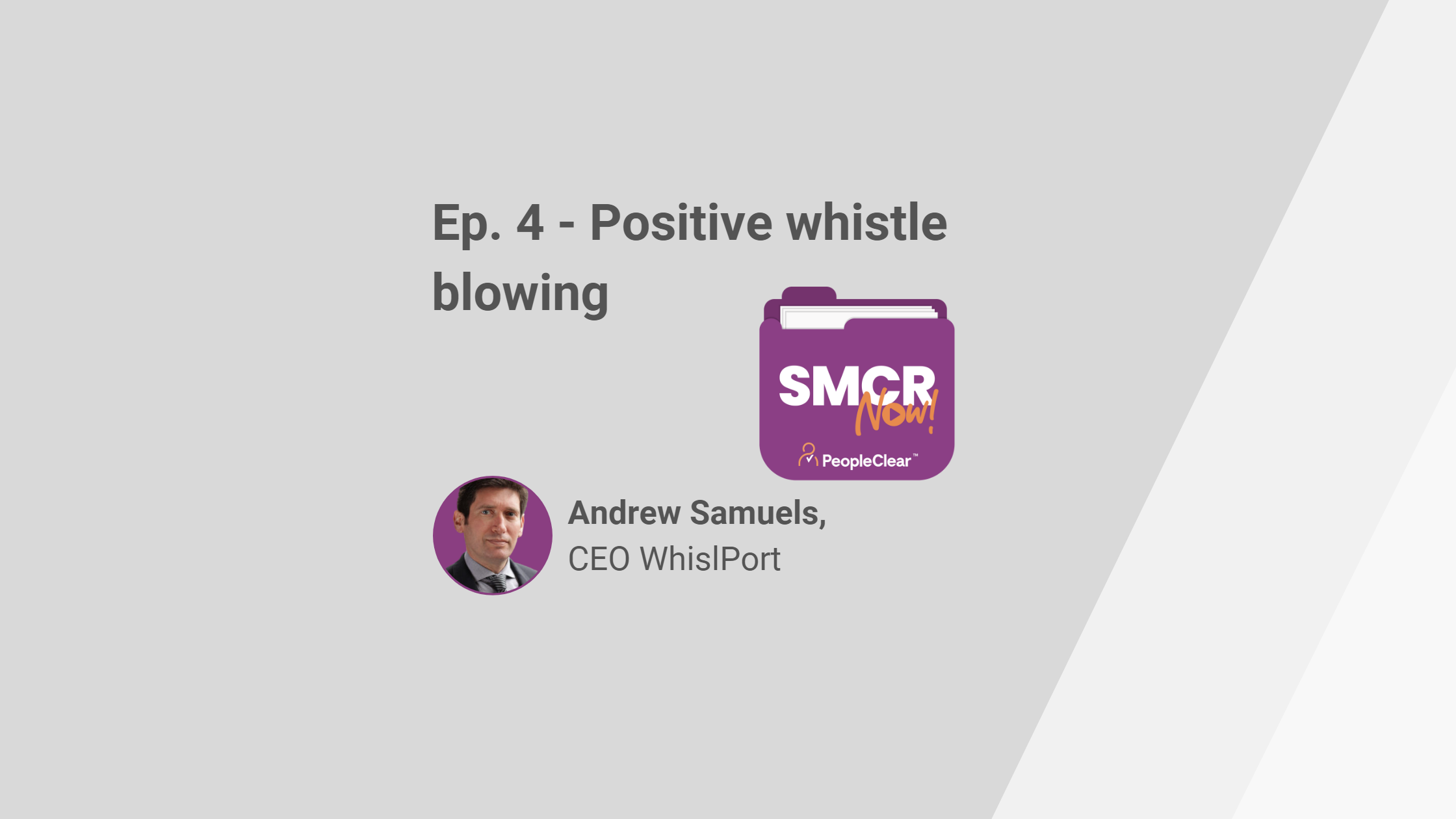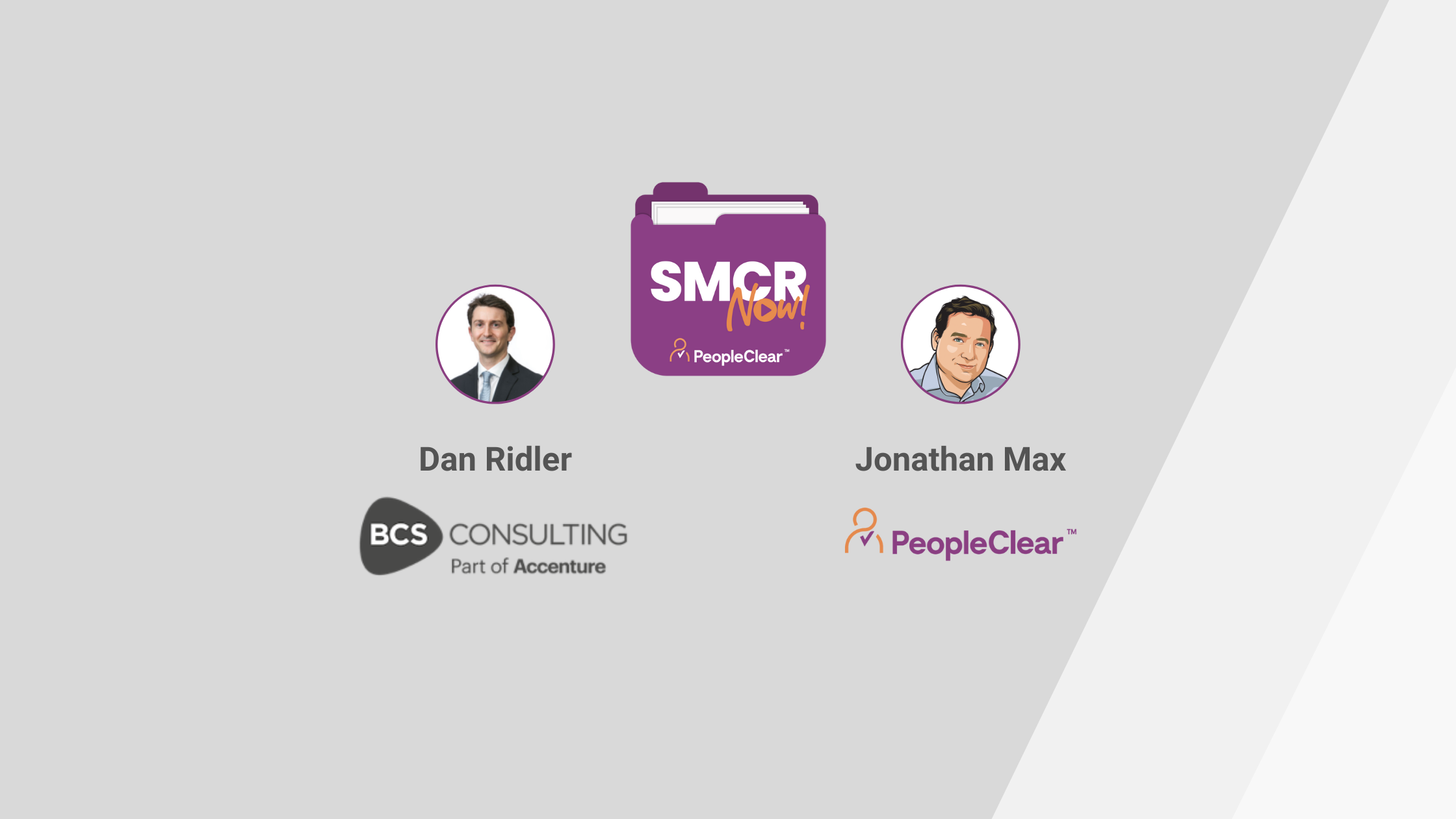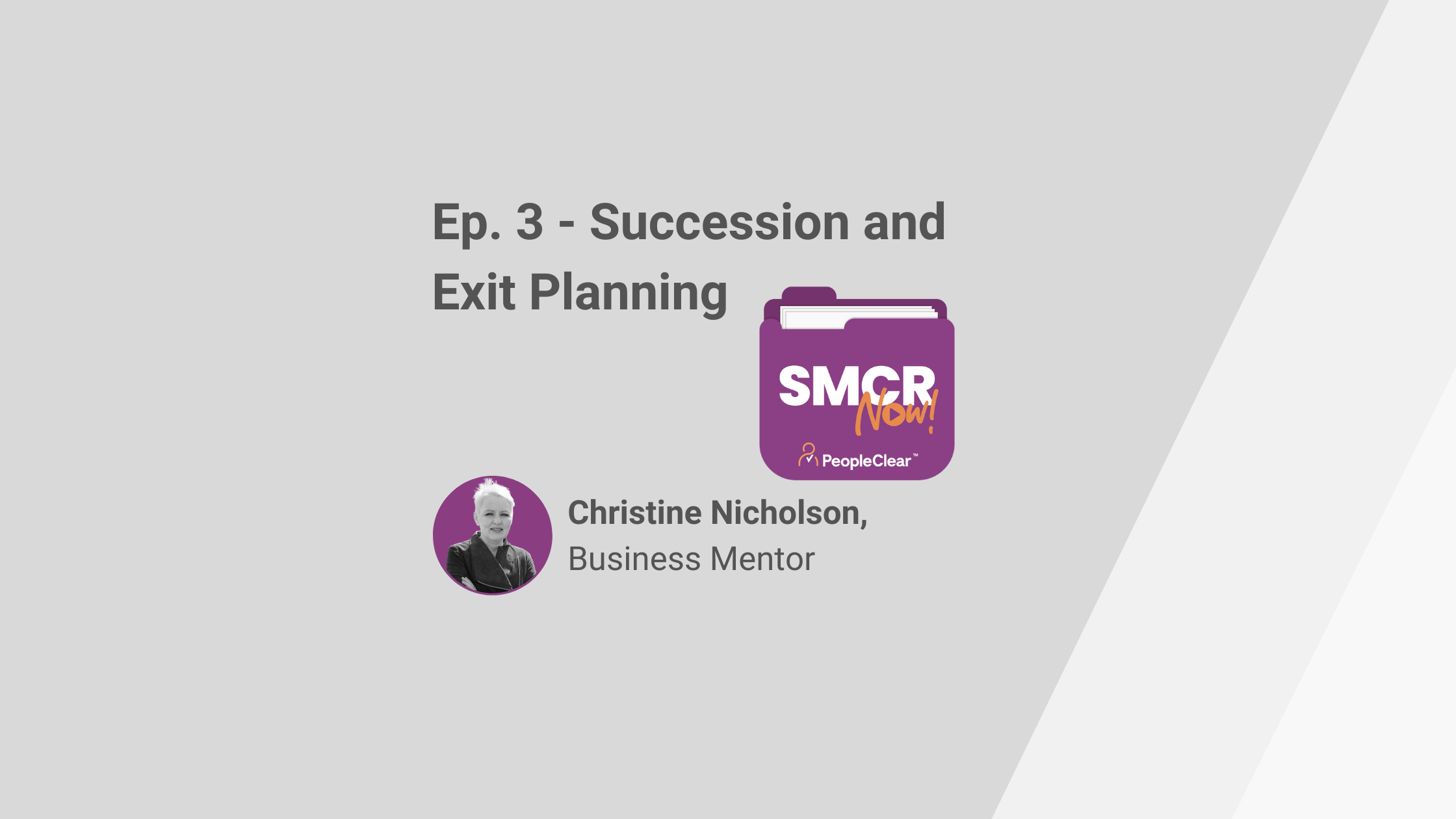SMCR Now! Episode 4: Andrew Samuels, CEO of WislPort

Welcome to another episode of SMCR Now. This series aims to answer the most important questions surrounding The Senior Managers and Certification Regime (SMCR) by sharing the thinking and the experiences of some of the many players involved with SMCR.
We’re trying to help businesses to improve their compliance, demonstrate best practices and mitigate against future risks. Whistleblowers have a crucial part to play in this area, so how can companies help to promote helpful whistleblowing? In today’s episode, I am joined by Andrew Samuels. Andrew is the CEO of WislPort, an organisation dedicated to helping companies with their whistleblowing policies.
SMCR IS ALL ABOUT MAKING PEOPLE ACCOUNTABLE FOR THEIR ACTIONS. HOW DOES WHISTLEBLOWING FIT INTO THE SMCR REGIME?
Whistleblowing enables accountability. So organisations should have effective whistleblowing programmes and provide channels for people to report any concerns that they have. It’s also about managers and senior leaders within organisations encouraging people to speak up safely.
It’s not just about your own actions. It’s about the actions of people that you work with or who work for you, and making sure that they’re doing the right things. Accountability comes from an individual saying, “I’ve seen something, I’m not comfortable with this,” and then, at the organisational level, they’ve provided a channel for people to be able to speak up, so that something gets done about it.
In doing so, this protects your organisation, protects the individual, protects the customers, and absolutely ties in with section 18 of SMCR as well.
DO YOU THINK THAT COMPANIES ARE FEARFUL OF WHISTLEBLOWERS? AND WHAT CAN COMPANIES DO TO MITIGATE AGAINST THAT?
When you hear about whistleblowing in the press, it’s because something’s gone wrong. And that’s very much the tip of the iceberg. What you don’t hear about, a lot of the time, is when whistleblowing goes right.
Organisations shouldn’t fear people speaking up when they’re concerned, they should actually embrace that, because people who want to speak up to protect an organisation are loyal customers. They are actually assets, rather than liabilities, if you want to look at it from that perspective.
There’s a lot of statistics out there that show that organisations that do listen to their whistleblowers have a better return on investments. For example, on average, they have a 2.8% increase in return on assets.
People just don’t hear about that in the news. What they hear about, is that somebody’s leaked something to the media, or something to the press, or that something’s gone wrong. People look at the Volkswagens and the Boeings, but they are organisations that didn’t listen to their whistleblowers. The organisations that do listen to their whistleblowers, you don’t hear about them in the press, and their legal bills are down by about 26% as well.
BUSINESSES HAVE AN ETHICAL OBLIGATION TO PROTECT AND SUPPORT THEIR WORKFORCE. HOW DOES WHISTLEBLOWING FIT INTO THAT?
I think, from an ethical perspective, whistleblowing is such a bellwether of a strong culture, where people feel safe and protected in speaking up. It really tells you something about an organisation, where the leadership are not just saying “We want to hear what you’ve got,” but they are demonstrating their support for that, through the right controls and protections.
Taking action is important as well, because people who speak up want to know that three things are going to happen. Firstly, they want to know that the information they’re providing is warranted. Secondly, they want to know that something’s going to be done with that information. And, finally, they want to know that they’re going to be protected and valued for doing that.
You can tell that there is a strong ethical culture within an organisation, when those three measures are actually taken into account.
WHAT MORE CAN BUSINESSES DO TO HELP AND ASSIST WHISTLEBLOWING AND WHISTLEBLOWERS?
I think they can take a fresh look at whistleblowing. I think they can look at it as an effective way to listen to their people. Instead of putting it out there as just a policy, just a phone line on the side of the desk where somebody may take a call, businesses should be actively encouraging people to speak up and to listen.
With these practices in place, you’ll see that people will start to feel more comfortable, saying things like “I used the whistleblowing channel six months ago because I wasn’t sure about an accounting fraud.” And somebody else will say “You know, that’s interesting, because I’ve seen an irregularity over there as well, and I wasn’t quite sure if the organisation would do something about it.”
It’s also a form of viral marketing, to some extent. The more that people feel comfortable that something has gone right, because the operational side is solid and because the managers and leaders are well trained, the more value you’re going to get out of that as an organisation.
As I’ve already mentioned, it’s proven that good whistleblowing operations do an improved return on investment. So it’s ethically the right thing to do and, from a financial economic reputational perspective, it’s also the right thing to do.
SO WHISTLEBLOWING CAN BE VIEWED AS ACTUALLY PROVIDING A SAFETY NET FOR COMPANIES?
It’s absolutely a safety net. I think one of the challenges we get from organisations is, “If we open up our whistleblowing channels to everybody, we’re just going to get a deluge of people raising complaints about frivolous things.” But actually, that is not the case.
As long as you’ve got effective training in place and the right communications in place as well, people know when to raise their concerns via a whistleblowing channel or speak-up line, they’re not going to call up to say “Bob stole my sandwich.” They know better than that, because they’ve been trained to distinguish between the two.
What it does do though, is it really does let you know what’s going on in your organisation, and help your people to feel empowered. And as a result, you do get those economic and reputational benefits.
ARE YOU SURPRISED THAT WHISTLEBLOWING HASN’T RECEIVED MORE POSITIVE PRESS IN THE PAST?
No, because effective whistleblowing doesn’t make it into the public domain. You don’t hear about the things that go right. And you do hear about the things that go wrong. But that’s why it’s important for people like ourselves to go out there and start to change that message, because that’s our obligation to help organisations get the value out of regulations such as SMCR, for example.
It’s not just something you can do as a tick box, when it’s done well, you can actually derive value as an organisation by doing that. So it’s time to change the narrative a little bit, it’s time to stop thinking about the things that have gone wrong with whistleblowing, and to talk about the positives of whistleblowing. Let’s not talk about the tip of the iceberg that we’ve seen, let’s talk about that 99.96% that sits under the water, that we don’t see, that we’re not going to smash into with our Titanic.
Join us next time on SMCR Now! for more insights, more experiences, and more understanding of SMCR and how it applies across the regulated financial industry.

Welcome to another episode of SMCR Now. This series aims to answer the most important questions surrounding The Senior Managers…

Welcome to another episode of SMCR Now. This series aims to answer the most important questions surrounding The Senior Managers…

